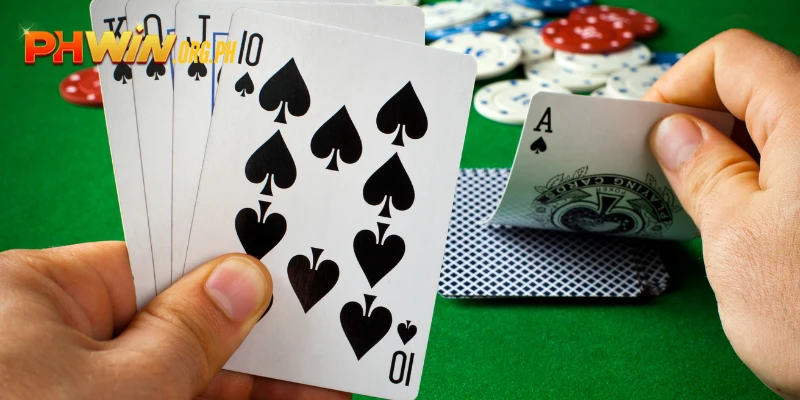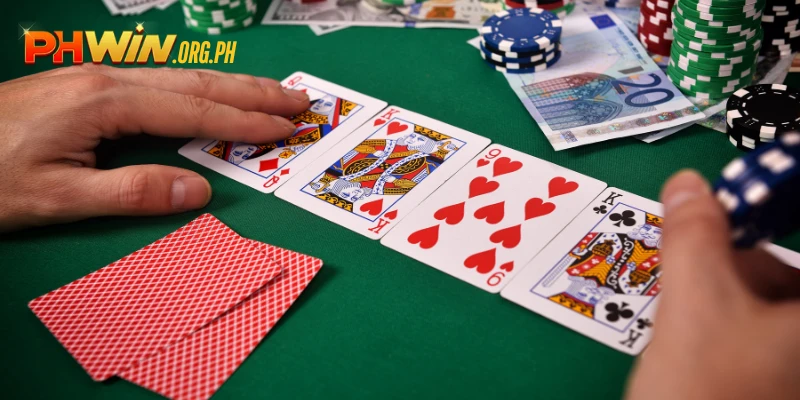In the world of Poker, a bad beat in Poker is a familiar term to players. It refers to a situation where a strong hand is defeated by a much weaker hand, often due to unexpected luck on the opponent’s part. This article will deeply analyze the roles of luck and skill in Poker, while also suggesting strategies to help gamers effectively cope with these “heartbreaking” situations. From this, you will gain a more complete understanding of bad beats and know how to transform defeat into motivation to continuously hone your personal Poker skills.
The Role of Luck and Skill in Poker
Poker is a game entangled with both skill and luck. Though skill is very much involved, there is no denying the role of chance. Cards get dealt and community cards revealed at the table at random, and hence each hand’s outcome is always uncertain.

In short-term games, there are chances for luck to influence the outcomes of winning and losing. One can win several hands consecutively due to the good fortunes of lady luck. Another player, however, may often experience bad beats even with playing very great skills. This inconsistency at times makes most of the gamblers feel hopeless and easily frustrated.
Nevertheless, in the long term, skill is the primary factor deciding the success of Poker players. Proper decisions according to probability calculation, reading the adversaries, and intelligent bankroll management will allow you to maximize your profit. A study shows professional Poker players have considerably better winning rates than amateur ones in large tournaments.
To better illustrate the role of skill, imagine this: you have a very good initial hand, whereas your opponent has very bad cards. Your chances of winning are very high, whereas the chances of your opponent winning are very slim. Yet, if you play poorly, take risks you don’t have to take, and allow your opponent to win, that’s playing poorly, not because of luck.
To win at Poker, you must understand how to combine the factors of luck and skill in harmony. Accept the fact that luck is beyond one’s control, but at the same time, regularly practice your individual skills. Concentrate on what you can master, like making decisions, being able to observe the behavior of others, and managing your emotions. When you put luck along with a good set of skills, your chances to win at Poker will rise substantially.
Tip: In order to raise your level of Poker playing, you can study through courses, books specifically about Poker, or participate in forums and gaming communities, such as at Phwin – to pick up tips from experienced gamblers.
Methods to Cope with a Bad Beat in Poker
Although bad beats often bring unpleasant emotions, you can completely turn that experience into motivation to improve yourself. Here are some strategies to help you overcome the impact of bad beats effectively:
- Manage Personal Emotions: Take deep breaths and stay calm before acting. Look at the positive aspects. Accept that the element of chance is inseparable from Poker. Do not make decisions when you are angry or sad.
- Summarize Experiences from Bad Beats: Analyze the hand again to identify strengths and weaknesses in your playing style. Consider whether you played too recklessly. Re-evaluate your ability to read opponents’ psychology and actions. Draw lessons on bankroll management and calculating pot odds/expected value.
- Maintain a Positive Attitude: Focus on long-term goals instead of just looking at the results of each hand. Have confidence in your abilities and personal skills. View failures as opportunities to learn and become more complete. Share experiences with other players to progress together.

According to one study, poker players with greater emotional control tend to perform better. Less susceptible to random outcomes, they are able to base decisions on solid reasoning.
Apart from this, regularly reviewing and re-tuning your strategy is also very much needed. Poker is a thinking game and calls for constant adaptability. Learning from bad beats and similar situations, your skills will get better and better and you will become a better Poker player.
The journey to success has never been smooth. Adversities and challenges are unavoidable. Yet, with the right attitude, spirit of advancement, and the burning passion for Poker, you can totally defeat bad beats and move closer to conquering the game.
>> Introducing Stud Poker: Rules, Guides & Effective Strategies
Enhancing Skills to Minimize the Impact of Bad Beats
To reduce the negative impact of bad beats in Poker, continuously honing your skills is mandatory. Here are some ways to elevate your Poker level and lessen the adverse effects of bad beats:
- Reading Opponents: Carefully observe opponents’ actions, how they bet, and their reactions. Pay attention to the amount of time opponents take to think before making a decision. Analyze their playing style, frequency of entering hands, and their level of aggression. Build player profiles to predict their next actions.
- Making Optimal Decisions: Apply strategic principles to Poker. Calculate probabilities and pot odds/expected value. Balance expected value and risk level. Adjust your playing style depending on each opponent and specific developments.
- Continuous Learning and Practice: Participate in specialized Poker strategy classes and workshops. Read books and articles from experts and professional gamers. Review and analyze played hands to identify areas for improvement. Exchange and share experiences with other players.
One study shows that Poker players who diligently practice and update their strategies often have a better ability to adapt to the changing nature of the game. They are also less influenced by emotions and rely more on logical reasoning when making decisions.
Alongside improving your skills, proper bankroll management also plays an important role in helping you overcome bad beats. Divide your money into smaller portions and only use a small portion for each playing session. Avoid going all-in unnecessarily and set loss limits to protect your capital. When you lose, know when to stop, review the hand, and prepare for the next playing session instead of trying to recoup losses thoughtlessly.
It should be noted that no strategy is absolutely correct in every situation. Poker is a constantly changing game that requires flexibility and high adaptability. Therefore, always be ready to adjust your strategy based on your opponents, the type of Poker being played, and other factors.
Suggestion: If you want to try your hand at online Poker, you might consider Phwin. With a variety of playrooms and opponents from all over, this is a good environment for you to practice and learn from experienced players.
Smart Bankroll Management
An important factor no less crucial than skills and strategies in Poker is bankroll management, which is the funds dedicated to Poker. Smart bankroll management will help you maximize profits, minimize risks, and effectively cope with bad beats.
First, divide your bankroll into multiple parts, with each part dedicated to a single playing session or tournament. Depending on your confidence and experience, you can allocate about 5% to 10% of your total bankroll for each session. This helps you avoid large losses in one go and gives you time to adjust your strategy accordingly.

Next, set loss limits for yourself. Once you reach your loss limit, know when to stop, take a break, and wait for the next playing session. Trying to recover losses after losing a lot often leads to unwise decisions and increases the risk of going broke. One study indicates that Poker players who apply a disciplined bankroll management strategy often have a higher return on investment (ROI) and are less likely to face bankruptcy.
Alongside setting loss limits, gradually increasing bet sizes when you are winning is also very important. However, you should only increase bet sizes when you have enough experience and confidence in your skills. Increasing bet sizes too quickly and suddenly can put you in unnecessary risks.
Another useful tip is to always set aside a portion of your profits (about 50%) after each winning session to add to your bankroll. This helps strengthen your capital and also creates motivation to continue improving your skills and strategies.
In summary, bankroll management is a mandatory skill for anyone playing Poker. By applying smart bankroll management principles, you will minimize the negative impact of bad beats while increasing your chances of long-term success.
Small tip: Utilize bankroll management support tools such as notebooks or specialized software to accurately and scientifically track your profits and losses. This helps you get an overview of your Poker playing performance and make necessary adjustments in the future.
Final Words
Through this article, we have delved into the concept of bad beats in Poker, how to cope with them, and how to reduce their negative impact. Bad beats are an inevitable part of Poker, and every player will encounter them at least once. Wishing you good luck and success on your journey to conquer the game of Poker! Don’t forget to visit Phwin to test your skills against formidable opponents and explore attractive reward opportunities!

Established Phwin after spending 12 years in the online gaming sector, with a passion to provide authentic internet gaming experiences. With an intimate understanding of the industry, coupled with a focus on excellence, I have spent the last 7 years ensuring that all players at Phwin get to enjoy thrill, integrity, and authentic fun with each play.
Come to Phwin today to feel our commitment make your play all the better with like-minded players. We appreciate your loyalty and trust in Phwin Casino all these incredible years.


